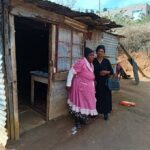A Ukrainian teenager, Vladyslav Rudenko, had his life turned upside down when Russian soldiers stormed into his home in Kherson in October 2022. The soldiers, clad in menacing black balaclavas, gave him only 30 minutes to pack his belongings before forcibly separating him from his family. At just 16 years old, Rudenko was ushered onto a bus along with several other Ukrainian children.
The bus drove them to a camp in Crimea called Druzhba, which translates to “Friendship” in both Ukrainian and Russian. This camp housed around 600 Ukrainian children and teenagers who were subjected to re-education by the Russian forces. The children were stripped of anything identifying them as Ukrainian, with one girl even having her T-shirt bearing the words “Glory to Ukraine” forcibly removed by the soldiers.
At the re-education camp, Rudenko and his peers were exposed to Russian propaganda videos and forced to pledge allegiance to the Russian flag every morning. When Rudenko resisted, he was isolated in a dark cell and given pills to “calm him down.” Later, he was sent to a military camp where he was trained to use weapons and drive tanks.
Despite the offers of a Russian passport, education at a Russian university, and Russian citizenship, Rudenko stood firm in his Ukrainian identity. He faced emotional and psychological pressure but eventually managed to make a call to his mother with the help of the non-profit organization Save Ukraine.
Save Ukraine has been working tirelessly to rescue children like Rudenko, with 777 children already brought back from Russian captivity. The organization’s founder, Mykola Kuleba, has spoken out against the systematic indoctrination and kidnapping of Ukrainian children by Russian forces.
Recently, Save Ukraine uncovered an online catalog in Russian-controlled Luhansk advertising 294 Ukrainian children for adoption in Russia. The children, ranging from five to 15 years old, are described based on their character traits and physical features.
Kuleba condemned this database as a form of digital trafficking, likening it to a “slave catalog.” The international community has been urged to take action to bring these children back to Ukraine and reunite them with their families.
In a plea for the return of Ukrainian children, Ukraine’s First Lady Olena Zelenska emphasized the heartbreaking consequences of the war. She called on world leaders to prioritize the safety and well-being of all children affected by the conflict.
Some siblings, like Ksenia, have taken matters into their own hands to rescue their family members. Ksenia successfully brought her brainwashed 13-year-old brother back from re-education in Russia, with the help of Save Ukraine. They now live in Kyiv, where Ksenia is pursuing a journalism degree to shed light on the impact of the war on Ukrainian children.
The stories of Rudenko, Ksenia, and countless others highlight the resilience and determination of Ukrainian youth in the face of adversity. As efforts continue to reunite kidnapped children with their families, the world watches with hope for a brighter future for all affected by the conflict in Ukraine.








